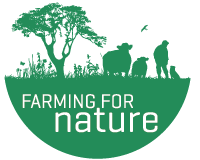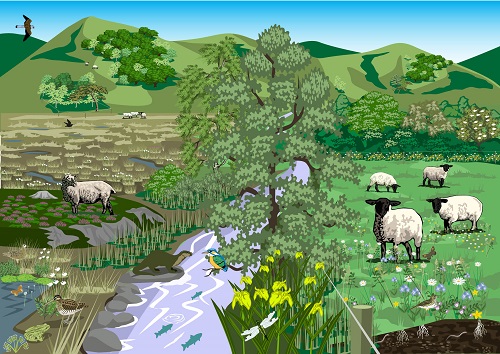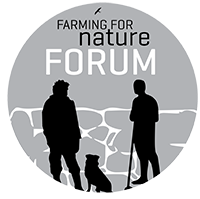SHEEP
Here are some practical ways to take climate action and enhance biodiversity on your sheep farm
Climate & Biodiversity actions full doc (pdf)
Sheep section only (pdf)
“By far the most dramatic change I have seen on the farm is when I went to daily moves of the flerd (…cows, sheep & goats…) onto fresh pasture in our holistic planned grazing system. By mimicking how nature has managed grasslands for millions of years I have seen the grasses starting to express themselves in their true form. For me growing healthy grasses is the fastest way to build soil organic matter and in turn store carbon from the atmosphere safely in the soil again. It makes me smile to think that plants and soil microbes can turn one of our biggest problems into a solution and a side effect is lush grass that can feed our livestock.” Cathal Mooney, Mixed stock farmer & FFN Ambassador, Co. Donegal
1. Bogs & uplands
Peaty soils store an incredible amount of carbon, but they are fragile – it can take ten years for a single centimetre of peat to form!!
- Retain (don’t drain!) bogs and wetlands
- Avoid burning, harvesting turf, forestry, or overgrazing on bogs or peatlands
- Rewet and enhance bogs and wetlands by blocking manmade drains
- Fence livestock off from sections of uplands to allow natural regeneration – historically our uplands would have supported a mosaic of trees, shrubs and grasslands
Co-benefits for farmers
- Flood and drought mitigation – bogs act as giant sponges, absorbing water and then slowly releasing it
- Cleaner water – bogs and wetlands purify water
- Reduced soil erosion
2. Pastures & soil
Healthy soils store carbon.
High grazing pressure can lead to long-term damage of soils. Sheep will also select for certain plants, reducing sward diversity over time. Make your pastures more climate and biodiversity friendly:
- Encourage species-rich swards to naturally fix nitrogen
- Move feeding rings regularly to prevent poaching and areas of heavy enrichment
- Keep soil aerated by avoiding compaction by heavy machinery or poaching
- Maintain low stocking rates (extensive grazing)
- Avoid reseeding permanent pastures
- Allow sward diversity to develop naturally by reducing grassland management intensity (limit fertilising/spraying) and by avoiding overgrazing (especially in May-June when flowering)
- Retain maximum soil carbon by minimising ploughing and reseeds
- Maximise the grazing season to minimise the need for imported feed
Co-benefits for farmers
- Reduced fertiliser and feed (cut costs)
- Improved drainage and drought tolerance
- Increased soil fertility and long-term yields
3. Nutrient management
The manufacture of chemical fertilisers generates ~1.4% of all carbon dioxide emissions. Furthermore, the application of both slurry and fertilisers releases nitrous oxide, a gas with 300 times the global warming potential of carbon dioxide. To reduce fertilizer use but still maximize grass growth:
- Maximise nutrient uptake by crops by maintaining optimum soil pH
- Create a nutrient management plan
- Retain, enhance or create buffer strips and hedgerows to slow run-off after application
- Use low emission slurry spreaders
- Switch CAN for protected urea
- Spread fertiliser and farmyard manure on warmer days (soil temp at least 6°C)
- Include nitrogen fixing legumes in swards or feed crops
- Use GPSs and tractor sensors for targeted spreading
Co-benefits for farmers
- Decreased fertiliser use (lower costs)
- Increased farm self-sufficiency (lower external inputs)
4. Trees, scrub & hedgerows
Woody vegetation captures carbon.
- In less productive areas, fence out sheep to allow for natural regeneration of native trees and scrub
- Plant native hedgerows
- Allow existing hedgerows to grow tall and wide
- Consider agroforestry/silvopasture
- Diversify farm enterprises by planting a native woodland
- Retain, enhance or create copses and scrubland in less productive areas
Co-benefits for farmers
In a sheep farming system woody vegetation can:
- provide diverse grazing
- provide shade & shelter
- improve animal welfare
- enhance biodiversity
- diversify farm enterprises
“Encourage clover at all costs, I have established perennial clover over the years. I think if you have to continually sow it, it defeats the purpose to some degree i.e., diesel use. Use your topper once a year ONLY, when plants have flowered. Use a contractor for silage, slurry etc. It’s much more efficient and they can afford the latest eco-friendly machinery. Manage your hedgerows and fields to maximise the benefits for pollinators, birds, etc. Dig a pond. Think up of new ideas to acquire fertiliser. An example would be to get your neighbours to deliver their grass and hedge clippings to your farm or a depot. You can then mix this with your farmyard manure. A lot of grass cuttings end up polluting streams and (are) often dumped. I’m a great fan of bush fruits and nut trees. They can be established easily, and need little maintenance with huge reward. E.g., Apple, Plum, Gooseberry, Blackcurrant, Hazel cob, Walnut, Raspberry, Loganberry, Blackberry. Saves buying fruit and nuts with a large carbon footprint and plastic packaging” Noel Kiernan, Sheep & Beef farmer & FFN Ambassador, Co. Longford
5. Water management
Our water bodies (rivers, lakes and oceans) naturally work together to support biodiversity and to store carbon. When water bodies are polluted, these systems break down. Almost half of Irish surface waters are not in good health and the situation is deteriorating. Help to restore our water bodies by eliminating harmful farm run-off:
- Retain, enhance or create wetlands buffer strips, field margins and native hedgerows to reduce run-off
- Never spread or spray inputs when rain is due
- Treat your chemicals with respect – just one drop of pesticide can pollute a small stream for over 30kms!!
- Reduce herbicide use by using alternative methods of weed control e.g. non-synthetic herbicides and diverse crop rotations. As many synthetic herbicides are water soluble (e.g. MCPA, 2,4-D), it is almost impossible to ensure they do not end up in watercourses after application
- List the potential sources of run-off from your farm and how you might eliminate them. Some of these (e.g. slurry, herbicides) are more obvious than others (e.g. spoil from tractor tyres, washings or waste silage).
- Manage grazing livestock: fence livestock well back from watercourses; don’t allow stock to drink directly from rivers or lakes; avoid poaching and pinch points
Co-benefits for farmers
- Reduced input, labour, fuel and machinery costs
- Cleaner water and good health – research has detected herbicides in 38% of drinking water wells tested in Ireland.
- Habitats – cleaner water benefits humans and nature alike
6. Energy & fuel
Maximising energy efficiency and moving away from fossil fuels are two ways in which sheep farms can minimise their carbon footprint.
- Consider renewable energy – a shed roof can be the ideal place to install solar panels and supports are increasingly available
- Consider solar fencers and water pumps
- Mend leaky pipes and troughs – drinking water production and supply requires energy yet >43% of treated drinking water in Ireland is lost to leaks
- Minimise chemical fertilisers, herbicides and pesticides – these are all manufactured using fossil fuels
- Reduce transport costs by producing more of your own inputs on-farm e.g. compost fertiliser, feed, bedding etc.
- Plastics are produced using fossil fuels – avoid suppliers that use excessive packaging
- Turn it off when not in use! Appliances, lights, machinery etc. all contribute to the farm carbon footprint
Co-benefits for farmers
- Reduced fuel and input costs
- Reduced energy costs
- Improved farm self-sufficiency and climate resilience
Curious? Have you run the numbers for a reduced stocking rate?
Reduced stocking rates: with the current shift in farm payments away from production and towards environmental measures (including extensive grazing), could reducing the intensity of your farming system now make sense from both climate and financial perspectives?
“I spoke to a conventional farmer recently. We talked about the profit from our farms, leaving out single payment, organic etc. This man buys stores and fattens them for the factory using concentrate. He also would use fertilizer, sprays, reseeds etc. After doing his sums this year he said he was only making €5 per hour for himself despite beef being a good trade in the factory. I would beat that €5 figure because I don’t have the significant and increasingly expensive overheads that he has.” Noel Kiernan, Sheep & Beef farmer & FFN Ambassador, Co. Longford
“A good stocking rate, where your results are monitored and recorded, can then be tailored to suit your needs.” Colm Gavin, Sheep farmer and FFN Ambassador, Co. Mayo.
“From what I’m doing on our commonage it has started to show results towards improving the scores for any future payments that may be there and we’re seeing better results from the sheep performance and that means a better financial return.” Pat Dunne, Sheep farmer & FFN Ambassador, Co. Wicklow.
Going organic
Have you run the numbers for going organic? New supports and a growing market are making this an increasingly attractive option for sheep farmers.
Nature co-benefits
Climate action on sheep farms can benefit nature by creating:
- More species-rich and diverse landscapes, supporting native fungi, insects, birds, mammals and more!
- Healthier rivers, lakes, estuaries and oceans, rich with life
- Habitat for our native species to feed and breed
- Nature-rich farms – loud with humming insects and singing birds
- A model for other sheep farmers; when we experience nature on another farm we are more likely to want to protect it on our own!
Nothing beats nature for providing natural climate change adaptation and mitigation. Boosting biodiversity, from the soil to the treetops, will help your farming system to remain productive and resilient in the face of increasingly unpredictable weather events.


